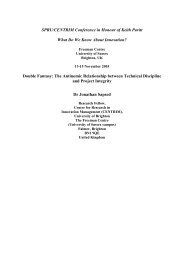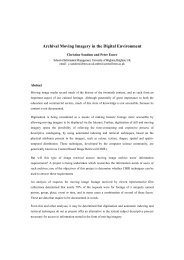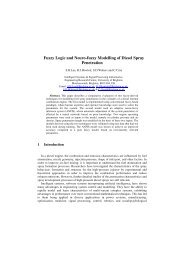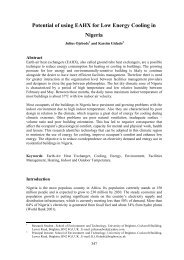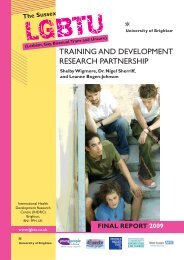TOP TIP - University of Brighton Repository
TOP TIP - University of Brighton Repository
TOP TIP - University of Brighton Repository
You also want an ePaper? Increase the reach of your titles
YUMPU automatically turns print PDFs into web optimized ePapers that Google loves.
or nationally. Work with fathers is welcomed when it happens, but it does not<br />
lead to many searching questions about local effectiveness if it does not happen.<br />
However, there is perhaps an important caveat here in that it is likely that a<br />
genuine dilemma exists for some practitioners in terms <strong>of</strong> their core beliefs about<br />
legitimate client focus. On the one hand, there is the issue <strong>of</strong> whether mainstream<br />
services (where the well-being <strong>of</strong> the child and/or the mother is usually the main<br />
focus), should be engaging with young fathers who may not be involved with the<br />
child or mother (e.g. because <strong>of</strong> exclusion or non-residency). If so, then there is<br />
a legitimate argument for the need for more specialised (as oppose to generic<br />
mainstream) services that can <strong>of</strong>fer dedicated support for young fathers.<br />
However, on the other hand, and as discussed earlier, research has demonstrated<br />
the impact a father can have on the developmental well-being <strong>of</strong> the child.<br />
Consequently, this suggests that even if young fathers are not directly involved<br />
with the child and/or mother, then mainstream services should try to engage and<br />
support young fathers as part <strong>of</strong> their broader remit <strong>of</strong> ‘working with parents’ in<br />
the same way that already happens with young mothers.<br />
So far in this section, we have drawn attention to the need for more ‘fatherfriendly’<br />
services. However, it is important to acknowledge that some young<br />
fathers are wary <strong>of</strong> involvement with services and collude with the historical<br />
service focus on mothers and children. For some, engaging with such services<br />
may be seen as ‘unmanly’. Such ideas form part <strong>of</strong> wider (and changing) notions<br />
<strong>of</strong> popular ‘masculinity’.<br />
Although there is an extensive literature on the concepts <strong>of</strong> masculinities and<br />
femininities (and it is beyond the scope <strong>of</strong> this publication to review it), it would<br />
appear that knowledge <strong>of</strong> contemporary thinking is very patchy amongst<br />
practitioners working with young fathers/parents. Whilst some agencies and<br />
projects are rooted in a deep understanding <strong>of</strong> such ideas, amongst others there<br />
is possibly a tendency to oversimplify. In such circumstances, promoting services<br />
for males is championed as a way <strong>of</strong> redressing the perceived excesses <strong>of</strong><br />
feminism, rather than part <strong>of</strong> responding to a more complex understanding <strong>of</strong><br />
how masculinities and femininities function in current society. From the author’s<br />
perspective, it would appear that a working knowledge <strong>of</strong> such ideas and how<br />
they might impact on young men and women in relation to fatherhood would be<br />
valuable for practitioners.<br />
Beliefs about young fathers<br />
Incessant stereotyping <strong>of</strong> young fathers has led to widespread ‘deficit beliefs’<br />
which include notions that young fathers are not interested in their children, are<br />
irresponsible, uncaring, and that young mothers are better <strong>of</strong>f without the<br />
(young) fathers <strong>of</strong> their children (Burgess, 2006a). Research evidence strongly<br />
contests the stereotypical view <strong>of</strong> the worthless and ‘feckless’ young father<br />
(Lamb and Lewis, 2004). For example, Suzanne Speak and her colleagues (1997)<br />
have shown that many young fathers fervently want to be involved with their<br />
children but <strong>of</strong>ten face significant barriers in doing so including inadequate<br />
housing, low income, and resistance from the mother or mother’s family. Other<br />
studies by Quinton et al., (2002) and Rolph (1999) confirm that many young<br />
men want to become and remain involved in their children’s lives, and that<br />
fatherhood for many young fathers, is viewed as a source <strong>of</strong> pride rather than<br />
something to run away from.<br />
INTRODUCTION<br />
Supporting Young Fathers 7




